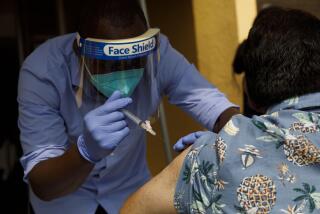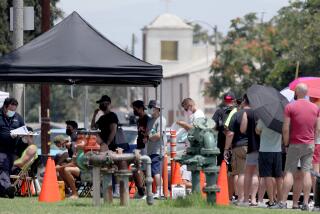U.S. Far Behind Schedule for Smallpox Vaccinations
- Share via
The nation’s top health official conceded Friday that the Bush administration’s smallpox vaccination program is significantly behind schedule and vented frustration at many hospitals for their unwillingness to participate in the voluntary effort.
U.S. Health and Human Services Secretary Tommy G. Thompson said it could take weeks to resolve the concerns of emergency health workers. The government hopes to vaccinate as many as 450,000 of them in the first phase of an effort to prepare for a potential bioterrorist attack using the smallpox virus.
“I’m concerned, of course, because we have to get prepared,” Thompson told a meeting of Times editors and reporters. “These are the individuals that are the front-line workers, the ones that are going to have to do the vaccinating, if we’re going to have a mass vaccination. They’re the ones who are going to have to take care of people if, in fact, there is a smallpox epidemic.”
Thompson’s remarks came the same day that the federal government raised its terror threat level to “high risk,” warning of a growing possibility that Al Qaeda would attack the United States during the upcoming Muslim holy days.
“We want to make sure that we give as much protection to our American citizens as we possibly can,” he said. “There are people out there that want to destroy America in any way they possibly can.”
When President Bush unveiled the smallpox program in December, Thompson said the first stage -- including inoculation of the medical workers -- would be completed by the end of February. As of Thursday, only 687 people had been immunized in the 16 jurisdictions that have begun vaccinating, according to the U.S. Centers for Disease Control and Prevention. Los Angeles County, the first vaccination site in California, immunized its first 27 volunteers last week.
Only 10 hospitals in Los Angeles County have submitted the names of employees willing to be inoculated, although the county had requested the lists by Monday. Fifteen hospitals have declined to participate, for now.
Thompson said that the delays in vaccination of hospital workers will have ripple effects on the entire program. It will slow the rollout of the next phase of the vaccination program, which is to include 10 million police officers, firefighters and paramedics, and could slow delivery of the vaccine to the public.
Thompson said he is surprised by hospitals’ reluctance.
“I would think that the fact that they are in the business of prevention and preparation and treating that they would be very eager to be able to get prepared for this eventuality, if it ever comes. We hope it never does, but we think they should be much more willing to cooperate.”
Thompson estimated that one-third of hospitals are willing. Another third won’t participate because the administrations or staffs don’t consider smallpox an imminent risk. The final third are waiting for the federal government to come up with a plan to compensate workers who become ill or miss work because of the vaccine’s side effects.
“We’ve had all kinds of planning going into this; the problem is that there is not a compensation fund,” Thompson said. His department is working with the White House and Congress to put a system in place as quickly as possible, Thompson said, but that process will take at least three more weeks.
Officials at the American Hospital Assn. said they have been encouraging members to participate in the vaccination program but can’t force them.
“Each institution is going through a very difficult process internally, and they’re coming out where they come out,” said Rick Wade, the trade group’s senior vice president. “We certainly can understand the secretary’s disappointment, clearly, but it’s each individual institution’s decision.”
One major obstacle is the opposition of several major health-care unions to the vaccination effort. Another problem is that some states won’t immunize health workers until their attorneys general determine whether their own workers’ compensation programs cover complications. The Arizona Department of Health, for instance, had planned to issue the first of 500 vaccinations this week, but announced Friday it would wait for a legal ruling.
In Texas, the attorney general ruled earlier this week that the state’s workers’ compensation fund would cover health workers who suffer complications, paving the way for vaccinations to begin Feb. 17.
“I think it has allayed some of the concerns, but not all,” said Doug McBride of the Texas Department of Health.
At present, smallpox is an indistinct threat, he said, “And in the absence of a known smallpox case, many people do not have an urgency to be immunized.”
Colorado issued its first vaccinations last week, but seven of 26 volunteers backed out, said Ned Calonge, chief medical officer for the Colorado Department of Health.
Like Texas, Colorado officials worked out compensation and liability issues before administering the vaccine. But some health workers -- and their unions -- remain concerned about side effects, or possible infection of family members who come into contact with the vaccine through leaking bandages.
For some states, the delay is related to practical day-to-day concerns. Oregon law requires children to receive their routine immunizations by Feb. 19. Many health-care workers there are busy administering those more mundane vaccinations.
“It really speaks to a lot of the concerns ... about how our bioterrorism preparedness might interfere with our ability to do bread-and-butter kind of health things,” said Oregon state epidemiologist Mel Kohn. “What we’re thinking now is, we’re going to start immunizing folks in March. But of course, were a smallpox case to appear somewhere we would spring into action immediately.”
More to Read
Sign up for Essential California
The most important California stories and recommendations in your inbox every morning.
You may occasionally receive promotional content from the Los Angeles Times.













